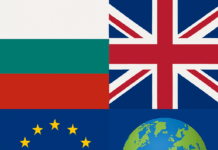By Rumyana Vakarelska
Nigel Farage, who has represented the worst of UK political life in the past few years and especially after last year’s European elections, has said in his latest plea this week that the UK does not need any more anti-racism laws. This could only send more young Bulgarians to look for a new job prospects in their home country or elsewhere in the world. However, the latest career fair in London proved that this is easier said than done.
Looking at his photo, most EU born UK residents would like to see Mr. Farage gone from the political scene in the UK and the European Parliament, where he holds a seat together with some 20 UKIP MEPs, making UKIP the largest UK party in the European Parliament.
As we are head into to the UK’s next general election, predictions show that Farage will get more than his current two seats in the UK Parliament, so his anti-EU immigration politics will not simply just go away.
The most recent furore with Mr Farage has been caused by a clip released on UK television from a documentary to be aired on 19 March, ‘Things we won’t say about race’ on Channel 4, where Farage says in an interview that the UK has won the battle against racism, ‘so the UK does not need any more anti-racism laws’. He also said that ‘when an employer is not allowed to choose between a British-born employee and someone from Poland, it is a ludicrous state of affairs’, implying that this will be considered racist. However, before Christmas he has said that he is concerned that anti-Semitism is on the rise in the EU, which makes him acceptable to many, leaving the ground open for propaganda against EU citizens.
In addition, Mr Farage, as this documentary demonstrates even before it is shown on the small screen, receives far too much publicity, although TV producers make these programmes most often to make the right points. This does not help young Bulgarians looking for work and a future in the UK, nor does it help the position of the Bulgarian professional community as a whole, although rules do not apply to individual choices and how job opportunities have turned out for the Bulgarian graduate and pot-graduate expats across the board.
So informed decisions, on where prospective Bulgarian-born graduates would be able to find jobs and how to choose which country to live in, proved to be much more complicated than attending a career fair in London, which is trying to help young Bulgarians go back to Bulgaria. This could be a most welcome development, not because of Nigel Farage, but because Bulgaria may face a worse demographic crisis than it already has. Bulgaria will only be able to attract its citizens living abroad back home unless it is soon able to set up a national policy towards the up to 2 million Bulgarians living across the world. These include top business people and governmental officials. Funding for such an initiative must be made available and the programme must be continuous similar to the ones run by Poland.
The third edition of this London recruitment event, run by the Career Fair, a Bulgarian NGO working across a few EU countries including Germany and the UK, left a number of unanswered questions about the work prospects for young Bulgarians who might be willing to go back home.
The demographic crisis that Bulgaria suffer Is based on the lack of serious efforts to attract experienced and well-qualified Bulgarians, not only recently arrived students, as the older generation has until now brought up one or two new generations of mostly UK-born children. The former, who have been investing in Bulgaria for years through visits, consumption, property maintenance and investment, as well as distantly supporting families and elderly parents, may be able to help with the stabilisation of the Bulgarian economy, foreign investor climate improvement, the rule of law and public accountability.
They could also run advisory services on the UK and Bulgarian employment markets across sectors for undergraduates and others and help fill the many gaps that initiatives like the above career fairs cannot achieve due to a lack of continuous participation in both job markets.
While the career fair initiative may be best to continue as a networking event, possibly through the student unions in the UK universities where Bulgarians may have chosen to study, it is unlikely in its current format to lead to a convincing vehicle that can represent serious interest of Bulgarian companies to attract the best back home.
A further break-down of whom this fair wants to attract and what its participants want to achieve is necessary. In addition, young people’s choice to choose where to work and live is based on many other life factors such as family, property ownership, the weather, languages, healthcare, civil society, cost of living and long-term prospects, which have to be addressed at least to a certain extent at such shows.
In the past, members of the ‘who is who’ in Bulgarian and international business with interests in Bulgaria attended big trade fairs like the famous Plovdiv Trade Fair, which sadly does not any more exist. Such a business line up is needed to attract the best of the Bulgarian students to go back to Bulgaria, but for now such events in the UK or in Bulgaria itself aimed at recruitment across the board and the top professionals across different age groups are not in existence.
What was striking at the above fair is the absence of listed companies (PLCs), while the stand of the leading Bulgarian Bank UniCredit-Bulbank was empty with only a few brochures being laid out. The representatives at the stands of mostly IT companies hardly brought in senior experts or people that could be role models in these companies. The number of post-graduates was minimal unlike the first edition of the fair. Companies outsourcing back office systems support make for an unlikely prospect for a graduate or post-graduate from notable UK universities who have made the effort to join and pay for a UK university, while meeting the increasing living costs and tuition fees in the UK. Some of these young people may get easily apprenticeships in Bulgarian-based companies, but this means that may find it even more difficult to go out in the international job markets.
Good examples of exploratory presences were represented in software companies such as Musala software and the Dutch company Strypes, which has opened an office in Bulgaria. However, the fair did not represent any possibilities for language, media, arts, economy or general management entry or more senior expert positions, so the scale of the fair has been narrowed down rather than expanded compared to its first edition.
As a result, the lack of a specific focus on what to look for in the Bulgarian job market and how to get it made for a distinct disadvantage for the career fair, having in mind that the Bulgarian undergraduates have also got access to their UK universities’ career services.
The Bulgarian State Agency of Employment was also present, but it only deals with the needs of job seekers once they are in the Bulgaria.
So, while this NGO’s work is making efforts to engage with a fraction of the potential Bulgarian employees that are already on the market, the Bulgarian Economy and Energy Ministry, the Bulgarian Foreign Ministry (MFA) or the Bulgarian Health Department, which has lost hundreds if not thousands of Bulgarian medical personnel to the UK’s NHS, and Bulgarian industry associations and large business were all absent. They have to now consider career programmes of a different nature.
Chances are that by next year Bulgaria can become more attractive as a job market, may be pushed by Germany at least in a few areas. Germany is the biggest foreign direct investor after the collective financial input of Bulgarians living abroad, at BGN 2 billion a year.
Frank-Walter Steinmeier, the German Foreign Minister, said during his visit to Bulgaria last week that more German companies will open doors in Bulgaria. Already, some 5000 German companies have chosen the country as their base over the last few years. According to Steinmeier, 8000 Bulgarians work in Germany, (assuming on qualified jobs), while Germany plans to increase its foreign investment in Bulgaria, especially in judiciary reform and competition for public procurement orders.
Bulgarian PM Boiko Borisov has asked Mr. Steinmeier for at least one big German automotive company to open a base in Bulgaria, while the German guest promised help with the ongoing reforms in the above critical areas to build investor confidence, while Daniel Mitov, the Bulgarian Foreign Minister, has asked Germany to help Bulgaria prepare for 2018 when the latter is going to hold the EU presidency.
Ends
© Copyright Rumyana Vakarelska 2015
Sponsors for the English language page in Budilnik are asked to please contact Rumyana Vakarelska, partner at Team New Europe, on teamneweurope@yahoo.co.uk.















